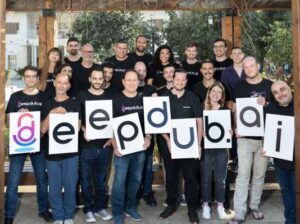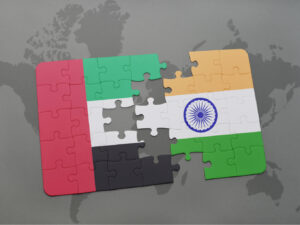| Image Credit: Fashion Potluck
Plan for the worst, Y Combinator told all of its portfolio founders amid layoffs and market downturn last month. Sequoia Capital joined with its own message to startups that warned of a “crucible moment.” Inflation, stock market meltdown and geopolitical issues have created uncertainty for the venture market.
As startups run to save cash, there is renewed interest and focus on bootstrapped startups. Bootstrapping is a situation where an entrepreneur starts a company with little capital, relying on personal savings instead of outside investments. Every month, we talk to a founder on their quest for investment but there are few like Julia Mitereva, co-founder of Fashion Potluck.
Has the Dutch workforce mastered all digital skills? Find out
What is Fashion Potluck?
The Amsterdam based startup Fashion Potluck was founded in 2016 as a fashion look sharing platform for women. Its co-founders, Julia Mitereva and Luis Galdamez Echeverria, observed that content created by its users were not limited to fashion. Mitereva says, “One of my first posts was also a soup recipe, do not ask me why.”
Seeing this influx of posts unrelated to fashion, the Dutch startup decided not to restrict its users and instead evolved to become “a platform for content sharing between women.”
“After multiple discussions and interviews with our users, we found out that this is what they wanted, needed, and still lack online – a safe and supportive environment for sharing content, interacting, and growing,” says Fashion Potluck co-founder Julia Mitereva.
Mitereva wants Fashion Potluck to become a “point of reference for women-generated content on the internet.” It is continuously adapting its services and concept to meet the needs of its users and its co-founders say the evolution has been both natural and consistent.
Building a safe space for women
Fashion Potluck can be described as a social media platform or even an engagement platform. But Mitereva says the platform is designed to be “a safe space for women” to “express themselves, share their thoughts, and network with one another.”
As a platform for content sharing between women, Fashion Potluck allows its users to post in multiple formats, and offers a marketplace for them to monetise their content. “We provide an ecosystem with a range of tools and services that facilitate freedom of expression and economic freedom of women,” Mitereva says.
Even if you see Fashion Potluck as a social media platform, it is so unique that you would struggle to find another platform for content sharing between women with similar depth. This lack of women-centric content platforms, according to Mitereva, is because most social media or content platforms are created by men. She says creators of these platforms don’t understand the need for a women-centric platform.
It doesn’t help that a large percentage of online abuse, hatred, and harassment is directed towards women while platforms also tend to censor content related to women’s health and sexuality. Just when Facebook parent Meta is transforming itself into a metaverse company, Mitereva says social media is “still in its infancy.”
She says “segmentation by topics, interests, formats, or gender preferences has only begun.”
“Community building is one of the main online ‘trends’ of 2021-2022 and beyond,” Mitereva explains. “Instead of catering to everyone, brands and companies are looking toward building niche and engaging communities around their values. We believe this trend will spread onto the social media oligopoly as well.”
How did they get to this product?
Fashion Potluck did not succeed right off the gate and in its six years of existence, the company has stumbled upon a number of challenges before becoming a torchbearer for women-centric content platforms.
Julia Mitereva says the biggest challenge has been the market, which was not ready for such a platform. In addition to ongoing competition for attention from social media users, she says the two biggest challenges have been “fighting the oligopoly” and “growing our startup.”
By oligopoly, Mitereva is referring to the dominant position held by the likes of Meta, YouTube, TikTok, and a handful of other players. “It is extremely hard to break into this oligopoly without serious funding and support,” she adds.
She also talks about the constant fight between these dominant players for the attention span of users. This requires a lot of human and financial capital and Mitereva says she did not want to engage in such practice. “[The] methods used by the big players are not always ethical and ethically building our platform is also important to us.”
“Growing our startup using outside resources has been a challenge. We have been in talks with a lot of investors, funds, and corporates who simply do not understand the concept nor the need for a women-centric platform. Unfortunately, men still dominate the VC environment,” Mitereva says. “This creates an ongoing challenge we have to overcome.”
Bootstrapping to succeed
Despite the industry being dominated by a handful of players and investors not ready for a women-centric platform, Fashion Potluck got itself off the ground by bootstrapping. The decision to bootstrap was not a conscious one. Mitereva says they did not plan to raise funds initially and did not plan to become a social media platform, either.
However, when Mitereva and Echeverria saw that their startup was morphing into a social media platform, they realised the need for more resources than they had available. She says Fashion Potluck could not find the resources needed within the Dutch tech ecosystem.
She also says there are very few visionary funds in Europe focussing on “long-term vision rather than immediate revenue numbers.” When asked about challenges faced by Fashion Potluck as a bootstrapped startup, Mitereva answers, “cost and having a limited potential to scale.”
“Bootstrapped companies also vary in the available pool of resources. In our case, we mostly struggled with development costs, human capital, and tiny marketing budgets,” she explains.
Mitereva is also extremely realistic and says that MVP (minimum viable product) is no longer enough to launch and grow. She says, “Today, with huge competition for every product that’s being launched, an MVP will not get you far. Everything you need to grow and compete costs a lot of money, time, and effort.”
Fundraising with a new approach
In February, Fashion Potluck announced raising $500,000 in the form of Seed funding that brought its total raised to $635,000. This seed round not only came out of a need to raise funds and grow the platform but also change in direction of its co-founders.
Mitereva says they realised the current landscape of the Netherlands will not favour them. They reevaluated their funding goals and made sure not to repeat the mistake of trying to fit in the Dutch or European landscape.
“We had a closer look at funds that paid attention to us and flew to Silicon Valley,” Mitereva says. “We stopped going after or interacting with European investors and shifted our focus towards US-based funds with a global vision.”
Julia and her co-founder Luis spent two months in California and attended all of the networking events in Los Angeles and San Francisco. She says they also activated the contacts of Luis to further make inroads with investors in the US.
“It was not easy and at times draining, but sharing your vision and talking to people without having too many expectations can get you far. Aside from all the tangible assets, we got reassuring and pumping feedback from globally known professionals in the field,” she adds.
What’s next for Fashion Potluck?
Fashion Potluck has demonstrated its strength to evolve its platform as the creator economy evolves. As the world embraces Web3 tools, Fashion Potluck does not want to sit and watch from the sidelines. It is planning to integrate NFTs and other Web3 tools into its platform.
“We believe Web3 provides wonderful opportunities for content creators,” she explains. “In the ecosystem we are building, the creator will take the main stage, being able to own the content she/them shares, govern the platform, assign uniqueness to digital products she/them sells, earn per sale or resale of those products, earn for attention and interactions, etc. We are excited about the opportunities and plans that lay ahead, as they also add another layer of empowerment and freedom to our womxn community.”
Fashion Potluck is not just looking to embrace and integrate Web3 tools but also collaborate with brands and companies looking to empower women. This July, the Dutch startup is planning to launch networking events for founders inspired by similar events in Silicon Valley.
“We got very inspired by the events we observed in Silicon Valley and we want to bring those best practices to Amsterdam, allowing for a more proactive and engaging founders ecosystem,” she says.
Catch our interview with Paul Down, Head of Sales at Intigriti.









